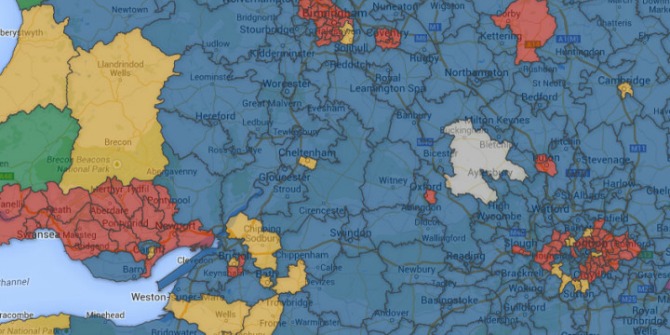Mark Carrigan continues his investigation of data science with this latest interview with Noortje Marres on Digital Sociology. Growing digital awareness means lots of opportunities for collaboration between sociology and related fields and there is also a chance for sociologists to challenge the deeply-rooted narrative of a clash between technology and democracy.
This interview is part of an ongoing series on the Philosophy of Data Science. Previous interviews in the series: Rob Kitchin, Evelyn Ruppert, Deborah Lupton, Susan Halford.
What is Digital Sociology? How does it relate to emerging approaches to inquiry across the social sciences such as Computational Social Science, Data Science and Digital Anthropology?
Digital sociology is a relatively recent term, it has only really come into use a few years ago, which is odd given the fact that sociologists have long played a central role in advancing our understanding of the computerization of social life. Some people propose to define digital sociology primarily in terms of its methods and techniques, saying that it’s centrally concerned with the new opportunities for researching society opened up by digital data. I think this explanation is misguided, as it often ends up simply making the case for a highly particular set of social research techniques, namely statistical methods of data analysis, which are fairly well-established at that. In my view, the recent interest in digital sociology is best understood in terms of changing relations between social life – as an object of research – and social analysis.
Especially crucial is the proliferation of instruments and practices of social analysis across social life in the form of social media platforms, digital analytics, the internet of things, and so on. In this situation, it is not simply the case that new data and new techniques become available for social research. Rather, it means that social actors, practices and events are increasingly and explicitly oriented towards social analysis and are actively involved in it (in collecting and analysing data, applying metrics, eliciting feed-back, and so on). This raises lots of questions about the ways in which technology participates in the representation and doing of ‘social life’, questions which in the past have been considered more of a specialist interest (for the sociology of technology). So digital sociology is a digitally aware form of social inquiry, one which does not seek to bracket the influence of digital technology in the doing of social life and social research. In terms of its relations to other fields, I think that this growing digital awareness in sociology creates lots of opportunities for collaboration between sociology and related fields like data science. Although paradoxically we might find that data scientists believe in society – in the sense of a universe made up of purely human interactions – much more than many sociologists!
You’ve spoken about the danger that Digital Sociology be “seized upon as an opportunity to re-enact the drama of the ‘two cultures’”. What do you mean by this?
In philosophy and the humanities and in the sciences as well, oppositions between science and culture and between technology and democracy run deep and have long tenacious roots. Take for example the classic opposition between technocracy – a society where experts and techniques of problem-solving dominate – and democratic culture – which is marked by open debate, diversity and the aspiration for equality in all things. Now in my view, digital culture and many of the digital practices that are developing across social life today cut across and unsettle these distinctions. Engaging with technology and practicing culture are becoming more and more entangled. ‘Expert’ practices of data capture, analysis and visualisation are closely associated with citizen initiatives focused on inclusion, advocacy and cultural expression. Like intellectuals of earlier waves of computerization, such as Donna Haraway, I worry that our enthrenched conceptual and moral frameworks do not allow us to appreciate these emerging, cross-cutting connections and what they make possible. In some ways, they are hard to recognize, especially because what is simultaneously occuring is a re-enthrenchment of what is in many ways a classic type of technocratic reason (i.e. we are seeing a re-affirmation of expert-led forms of innovation and governance and so on).
 Image credit: U.S. Centers for Disease Control (Wikimedia, Public Domain)
Image credit: U.S. Centers for Disease Control (Wikimedia, Public Domain)
Thus, on the one hand, in the current context there is a serious need for technology critique (digital critique), but at the same time it is a period in which we need and can develop a different kind of critique, one that is not so invested in the opposition between technology and culture. Indeed one of the most remarkable events in our contemporary context I think is the way seemingly “positivistic” technological practices like data analysis are being established anew as instruments of critical and creative awareness and intervention. We need to learn not just to work with such devices, but to think with them also.
Does digitization challenge the disciplinary structure of the academy?
I think the disciplinary structure of the academy has been challenged many times over and is continously being challenged. The question of whether existing disciplines are sufficiently equipped to ‘handle’ an emerging phenomenon, this question arises all the time as social problems confront us. It happened with ‘the environment’, with gender and race, genetics, popular culture, and so on. In this regard, the most interesting question is probably how we deal with this challenge in the case of digital sociality, and what reponses are possible in this case. I think it is fair to say that historcially the establishment of ‘new’, inter-disciplinary topics has been accompanied by much tension and in some ways has been dominated by antagonism between the advocates of what are then characterized as the new ‘object’ and the ‘old’ disciplines. While some of this is perhaps inevitable, I am interested in the possibility of developing tactics of inter-disciplinarity that work across and within disciplines, rather than being seen as ‘simply against’.
In the case of digital sociology, the ‘new’ phenemona – monitored living, trackeable sociality, and so on – have been very explicitly associated with what is undeniably a core concern of sociology, namely “the social,” and I think this circumstance carries some promise. Of course, there is the real risk that the type of “sociality” that is studied by digital sociologists, social media scholars, digital anthropologists and so on, will not be recognized as such by other sociologists and social scientist, and seen as not being about ‘the social’ at all, but about something else, like marketing. But I am hoping that the question of what distinguishes different forms and types of sociality, and why these differences matter, is of interest to scholars and researchers across different fields, and so we should seek to formulate this question in the broadest possible terms, while also recognizing that we are all “geeks” to an extent, with particular hang-ups and concerns.
This interview is part of an ongoing series on the Philosophy of Data Science. Previous interviews in the series: Rob Kitchin, Evelyn Ruppert, Deborah Lupton, Susan Halford.
Note: This article gives the views of the authors, and not the position of the Impact of Social Science blog, nor of the London School of Economics. Please review our Comments Policy if you have any concerns on posting a comment below.
Noortje Marres is Senior Lecturer in the Department of Sociology at Goldsmiths, University of London. Before that she was a Research Fellow in Science & Technology Studies at the University of Oxford, and a Marie Curie Fellow here in the Sociology Department at Goldsmiths. She studied sociology and philosophy at the University of Amsterdam, and did her doctoral research at that same university and at the Centre de Sociologie de l’Innovation, École des Mines, Paris. Noortje was part of the team that built the Issuecrawler, an online platform for the location and analysis of issue-networks, and is currently developingIssue Mapping Online. She convenes the MA/MSc Digital Sociology and is Director of the inter-disciplinary research centre CSISP (Centre for the Study of Invention and Social Process).
Mark Carrigan is a sociologist based in the Centre for Social Ontology at the University of Warwick. He edits the Sociological Imagination and is an assistant editor for Big Data & Society. His research interests include asexuality studies, sociological theory and digital sociology. He’s a regular blogger and podcaster.








great article